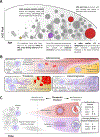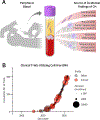Clonal Hematopoiesis: From Mechanisms to Clinical Intervention
- PMID: 34407958
- PMCID: PMC8854454
- DOI: 10.1158/2159-8290.CD-21-0901
Clonal Hematopoiesis: From Mechanisms to Clinical Intervention
Abstract
Our knowledge of how clonal hematopoiesis relates to diverse health conditions has grown vastly over the past years, touching upon many specialties beyond cancer medicine. Given that clonal hematopoiesis can act as a precursor to overt disease in many settings, the promise of early intervention has garnered much attention. In this review, we discuss the state of clonal hematopoiesis research and outline the challenges in developing clinical trials of early interventions. We anticipate that incidental findings of clonal hematopoiesis will become more common in the near future, but evidence-based efforts of how to manage these findings is currently lacking.
Significance: Our knowledge regarding the relevance of clonal hematopoiesis has increased drastically over the past years. However, evidence of how to manage these findings is currently lacking. In this review, we summarize the current state of clonal hematopoiesis research and outline the challenges of developing clinical trials in this field. We anticipate that incidental findings of clonal hematopoiesis will become more common in the near future and argue that there is urgency to start designing and conducting prospective trials.
©2021 American Association for Cancer Research.
Figures


References
-
- Champion KM, Gilbert JGR, Asimakopoulos FA, Hinshelwood S, Green AR. Clonal haemopoiesis in normal elderly women: implications for the myeloproliferative disorders and myelodysplastic syndromes. Brit J Haematol 1997;97:920–6. - PubMed
Publication types
MeSH terms
Grants and funding
LinkOut - more resources
Full Text Sources
Medical
Miscellaneous

